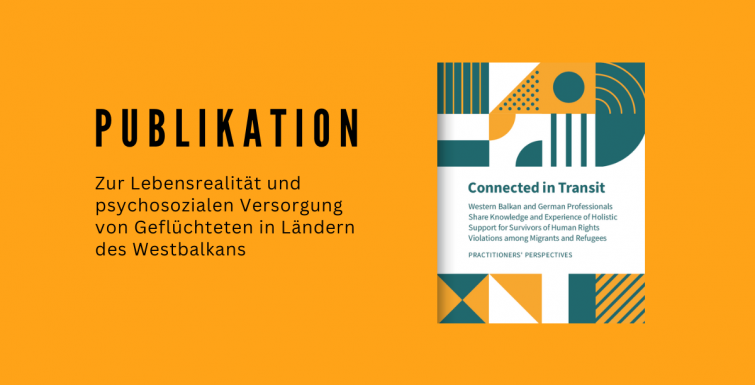Insights into practical work with refugees and migrants
A new publication shows the practitioners´ perspectives on psychosocial support for migrants and refugees in the Western Balkans and Germany.
The report reflects on the results and the process of the project „Sharing Knowledge and Practices“ which allowed professionals in the field to share knowledge and experience of holistic support for survivors of human rights violations among migrants and refugees.
Few areas embody a cross-professional, cross-nationality and cross-policy approach more strongly than the area of refugee and asylum policy. International and national law sometimes clash with the needs of asylum seekers and refugees. This conflict of values is often a significant factor for those working in the health care of such marginalised individuals who are having to deal with the aftermath of loss and cruel human rights violations.
Through the project, staff members from Germany, Serbia and Bosnia and Herzegovina were able to connect and exchange experience: At first during a series of online web-exchanges and later on during mutual visits and study-trips.
The publication uses good practice examples, concrete case stories and recommendations from the involved practitioners to show the relevance of the project, but ultimately the importance of transnational exchange between the so-called transit and receiving contexts.
The publication is available for download in English, Serbian and Bosnian.
Participating organisations in Germany, Serbia and Bosnia and Herzegovina were:
BAfF, Germany
Centre for population policies and sustainable development (CPPSD)
FATRA Frankfurt, Germany
Grupa484, Serbia
Lichtpunkt, Germany
PSZ Düsseldorf, Germany
Psychosocial Innovation Network (PIN), Serbia
Refugio München, Germany
World Vision Bosnia and Herzegovina
Xenion Berlin, Germany
Žene sa Une, Bosnia and Herzegovina
The project was funded by a grant agreement in the framework of the regional programme “Preventing and Combating of Human Trafficking in the Western Balkans” implemented by GIZ and on behalf of BMZ.
Connected in Transit: Einblicke in die praktische Arbeit mit Geflüchteten und Migranten
Eine neue Publikation ermöglicht einen Einblick in die Perspektiven der Praktiker*innen im Feld der psychosozialen Unterstützung von Geflüchteten und Migranten in den westlichen Balkanstaaten und in Deutschland.
Der Bericht reflektiert die Ergebnisse und Prozesse des Projekts „Sharing Knowledge and Practices“, dass Fachleuten aus der Praxis ermöglichte, Wissen und Erfahrungen mit ganzheitlicher Unterstützung für geflüchtete Menschen, Überlebende von Menschenrechtsverletzungen und Migrant*innen auszutauschen.
Es gibt nur wenige Bereiche, in denen ein berufs-, länder- und politikübergreifender Ansatz stärker zum Tragen kommt als im Bereich der Asyl- und Migrationspolitik. Internationales und nationales Recht können mit den Bedürfnissen von Asylbewerbern und Geflüchteten kollidieren. Dieser Wertekonflikt ist oft ein bedeutender Faktor für diejenigen, die in der Gesundheitsversorgung dieser ausgegrenzten Menschen arbeiten, die mit den Folgen von Verlusten und grausamen Menschenrechtsverletzungen fertig werden müssen.
Durch das Projekt konnten Mitarbeiter*innen aus Deutschland, Serbien sowie Bosnien und Herzegowina Kontakte knüpfen und Erfahrungen austauschen. Zunächst im Rahmen einer Serie von Online-Treffen und darauffolgend durch gegenseitige Besuche und Studienreisen.
Die Publikation zeigt anhand von Good-Practice-Beispielen, konkreten Fallbeispielen und Empfehlungen der Teilnehmer*innen die Relevanz des Projekts, aber letztlich auch die Bedeutung des transnationalen Austauschs zwischen den sogenannten Transit- und Aufnahmekontexten.
Die Publikation steht zum Download auf Englisch, Serbisch und Bosnisch bereit.
Teilnehmende Organisationen in Deutschland, Serbien und Bosnien und Herzegowina waren:
BAfF, Deutschland
Centre for population policies and sustainable development (CPPSD)
FATRA Frankfurt, Deutschland
Grupa484, Serbien
Lichtpunkt, Deutschland
PSZ Düsseldorf, Deutschland
Psychosocial Innovation Network (PIN), Serbien
Refugio München, Deutschland
World Vision Bosnien und Herzegowina
Xenion Berlin, Deutschland
Žene sa Une, Bosnien und Herzgeowina
Das Projekt wurde durch einen Zuschussvertrag im Rahmen des Regionalprogramms der GIZ “Preventing and Combating of Human Trafficking in the Western Balkans” finanziert, welches im Auftrag des BMZ durchgeführt wurde.


